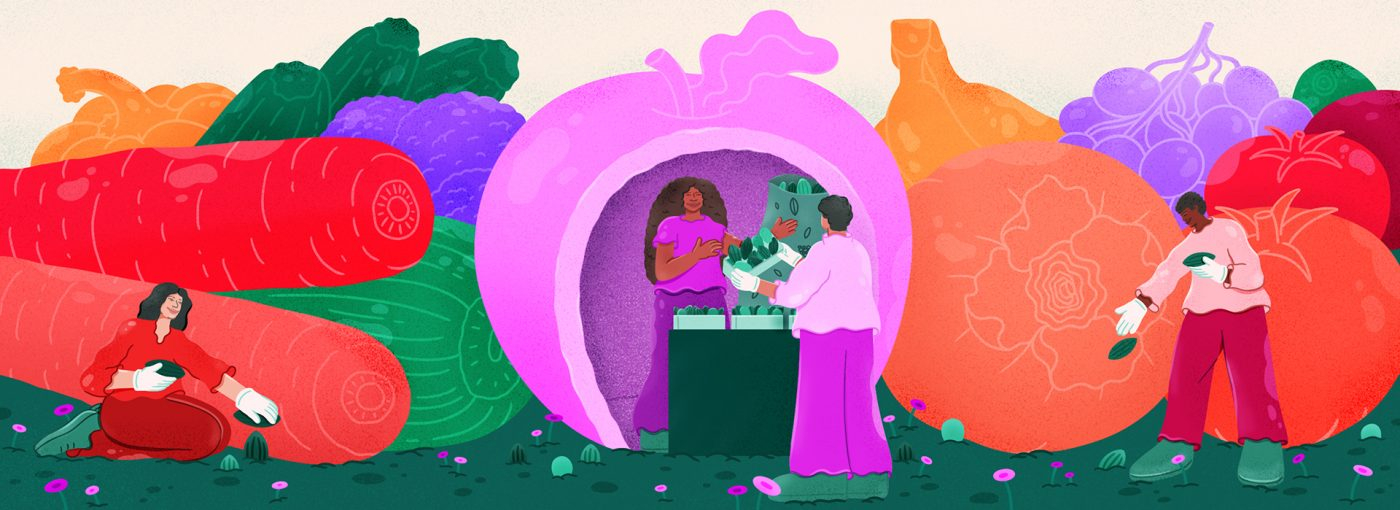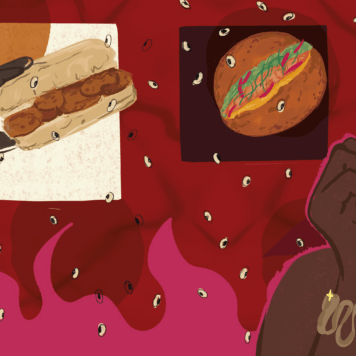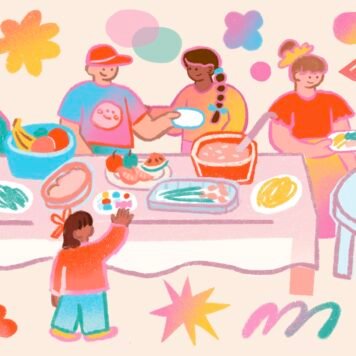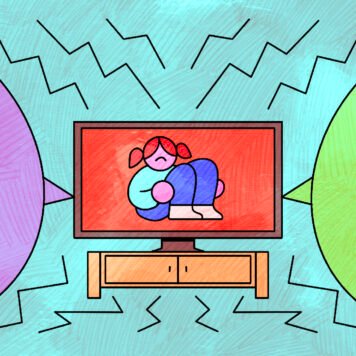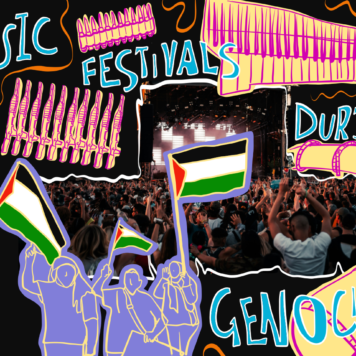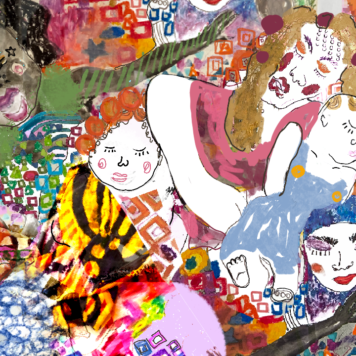Food is a prism through which almost all major political and social issues can be refracted.
The journey our food has been on by the time it gets to our plates is likely to have included international travel, environmental destruction, corporate profit making and exploitation of workers.
However, this is all concealed by the time that it’s wrapped in plastic, branded and placed on the shelves of our supermarkets. The fact that at some point this food grew out of the soil, or ate something that grew out of the soil, is completely hidden from view, and can therefore sometimes be hard to imagine. This disconnect often makes the possible ethical and environmental choices (and subsequent impact) we could be making seem irrelevant or out of reach.
Britain’s rude awakening
However, the impact of COVID-19 and Brexit on supply chains in the Global North led to a noticeable absence of food on our shelves: it challenged the UK’s ideas of infinite choice and started to get people questioning: where and how we get our food?
This has since been framed as an issue of ‘food security’ – a typically reductionist, capitalist and competitive way of looking at how we feed ourselves.
This is problematic because it focuses on the ability of a nation state to merely access and store enough food – provenance, health or political context notwithstanding.
Corporate greed
The current dominant model of food production is controlled by corporations rather than communities, with the emphasis placed on profit rather than the health of humans and their environment.
Globally, the industrialised production and distribution of food is controlled by a small number of conglomerates We can see the impacts of this in devastating ways, from high levels of carbon emissions, deforestation, violence within industrial animal agriculture, soil destruction, pesticide pollution to land grabs, health crises, food deserts and the mistreatment of migrant workers.
What is food sovereignty?
For a more politically, ecologically and socially rounded understanding of these complexities, and one which brings back the relevance of the journey taken by the food itself, we need to look to the concept of food sovereignty.
The concept of food sovereignty comes from the work of food producers and social movements in the Global South, and has inspired and grounded social movements all over the world.
It was first conceived in 1996 by La Via Campesina (‘the International Peasants’ Movement’) and articulated in the Nyeleni Declaration which emerged from the first food sovereignty gathering, held in Mali in 2007.
The Declaration defines food sovereignty as: “the right of peoples to healthy and culturally appropriate food produced through ecologically sound and sustainable methods, and their right to define their own food and agriculture systems.”
The six pillars of food sovereignty are as follows:
- A focus on food for people
- To value food providers
- Localised Food Systems
- De-centralisation of food governance
- To build knowledge and skills
- To work with nature
The concept of food sovereignty serves as a guiding light. It is a clarification and an inspiration to the many worldwide movements working to transform our food systems, in all their different ways.
What does food sovereignty mean to me?
I’m a community food grower in London, and have been working within projects around food sovereignty for the last ten years.
My work has spanned many different movements working to transform food systems. It has involved growing organic salad in Hackney for a veg box scheme, teaching primary school children how to grow food in an East End city farm, running therapeutic gardening sessions focussing on wellbeing, and growing vegetables and herbs for a project focused on food justice and building community power.
It has also meant being part of the political networks around this work, including the London based CFGN (Community Food Growers Network) and the national Landworkers’ Alliance who are also a member of the international La Via Campesina Network. It has also involved attending protests and demonstrations against Monsanto, GM, the Tories, and climate change, as these all affect the food system.
When I’m buying food, I try to source from places, people and organisations who are working with these issues, because I find that knowing where my food has come from, and being able to imagine the producers and the land from where it came, brings more joy, connection and alignment. So it’s a regular practice to think about the journeys and impacts of the food I consume, and similarly other products I use and interact with.
Why ethical consumption can never be the only solution
However, it is also useful to be sceptical about the idea of ethical consumption as a theory of change, as it can be an individualistic and simplistic response to a complex systemic problem.
It’s well known that 71% of all emissions are produced by 100 companies, and BP itself invented the carbon footprint to transfer responsibility onto the individual. We should remember this while making our consumption choices, because individual guilt about imperfection isn’t helpful by itself, and can prevent people from making efforts.
What’s important is all of us doing everything we can, and embracing the clumsiness that comes with trying to challenge a system that you’re entangled in. My journey has taught me that we need both systemic and individual change, and that there are ripple effects from one to the other.
Subscribe to shado's weekly newsletter
Exclusive event news, job and creative opportunities, first access to tickets and – just in case you missed them – our picks of the week, from inside shado and out.

Organisations working for change
This drive for both individual and system change is at the heart of community rooted groups, organisations and cooperatives, who come together to practise prefigurative politics, to create the living food systems which work for people and the earth.
One organisation is the London Freedom Seed Bank, a network of food growers and gardeners in London dedicated to saving, storing and sharing open-pollinated seed. This group of urban gardeners create and manage a living seedbank of seeds which are adapted to growing in the city, and play an important role in the global fight for seed sovereignty. They also give out London-bred vegetable, herb and fruit seeds, teaching others how to save seed.
Exposing violence and colonialism in our supply chains
In addition to saving seed we need to celebrate and empower food producers and offer solidarity throughout difficult economic and weather conditions. This involves raising awareness of the struggles faced by those in the unseen roles within the industrial food system, and supporting ways for people to access food that brings joy and sustenance rather than just hiding the violence in the supply chain.
Most importantly, we need to learn more about the history of land struggles in this country and the worldwide and long lasting impacts of colonialism and slavery. We need to appreciate how deeply intertwined these issues are with the current global food trade.
An understanding of food sovereignty can help to uncover the links between disparate people, landscapes and communities and transform our understanding of how this links to issues of social justice. We need to understand the political and economic reasons why access to good food is so unequal, and consider how we can increase this access in our projects.
Solutions
One way organisations could support this is by adjusting the pricing to a sliding scale model, creating more equity, so people on different incomes can get real good food, in accordance with the Right to Food movement.
At Granville Community Kitchen, where I work as a grower, we are trying out this model in our new Good Food veg box scheme, where we have three price points for the box, depending on your resources. We are also offering different ‘add-ons’ for the box to access traditional ingredients for diasporic communities.
Through this project, we’re working with localised food systems, in recognition that reducing food miles is also a crucial part of the picture – though the ‘local’ is not the only thing to consider. We also need to be creating healthy models for international trade to ensure we can access diasporic crops for communities whose traditional foods can’t be grown in this climate.
Greenwashing our food
When discussing solutions to the issues with our current food systems we need to concern ourselves with corporate co-opting of food growing and the greenwashing by big companies looking to cash in on people’s fears around climate and desires for a more intimate relationship with nature.
We can see this in the growth of the luxury health food industry, like Whole Foods (owned by Amazon), and the development of corporate veganism – KFC and McDonald’s producing vegan burgers isn’t the win for the climate that they want us to think. Similarly there are concerns about the interaction between gentrification, developers and community food growing spaces – have a look here at this video from CFGN exploring some of these issues.
Connecting through food
Food, in its production, distribution and consumption, can reveal all sorts of unpalatable truths about the building blocks of the current systems, but it can also be a way to a more engaged and healthy relationship with the other living creatures of the world.
So while my experiences of food sovereignty in practice may be very different from a landless peasant in Brazil, a rural farmer in Aberdeenshire, or a community of fisherfolk in Thailand, we are all connected through this work and through these mycelial strands.
There’s room for everyone in the fight for food sovereignty. I warmly invite you, in whatever way you can, as citizen, neighbour, eater, lover of life, to support and celebrate your place in local food systems and engage with the wider movement’s belief that all communities should be able to have control, choice and agency over the food they have access to.
What can you do?
- Join the Landworkers’ Alliance fair in July
- Become a member of Landworkers’ Alliance
- Read Stuffed and Starved by Raj Patel
- Read Agroecology and Regenerative Agriculture Sustainable Solutions for Hunger, Poverty, and Climate Change by Vandana Shiva
- Read shado’s guide on seed sovereignty
- Read shado’s guide on food sovereignty
- Learn How Kenyan farmers are reclaiming Indigenous practices of seed saving from cultural colonialism
- Find out about the work of Soulfire farm
- Find out about the work of Landworkers’ Alliance (including reports etc) and the work it’s doing as ‘Food in Our Hands’ in building the UK Food Sovereignty movement
- Find out about the work of the Community Food Growers Network
- Find out about the work of Land in our Names
- Listen to the podcast Farmerama which shares the voices behind regenerative farming
- Support the Right 2 food campaign
- Follow the LWA’s food in our hands project
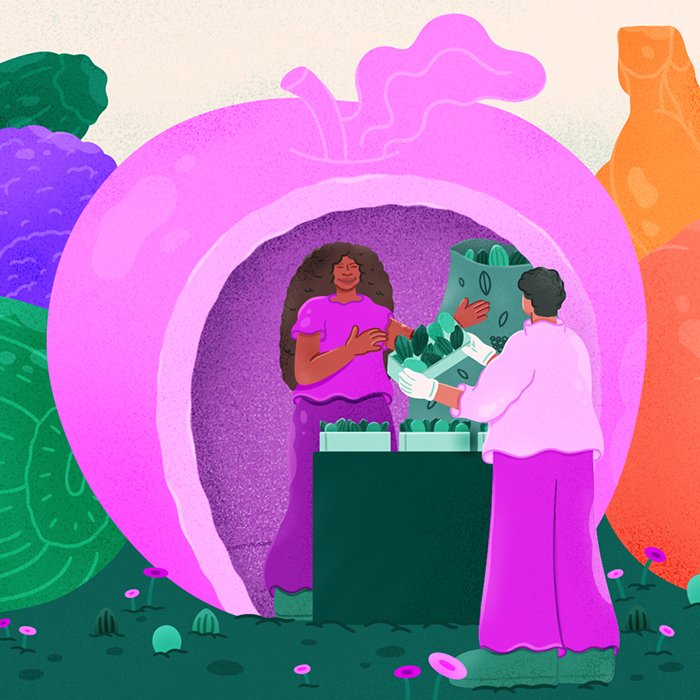
Artist concept: For this piece, I was really inspired by the London Freedom Seed Bank and their work. Teaching folks how to garden and grow your own food is a concept I know of, so I thought it was refreshing to read about starting even earlier in the food journey and teaching and saving seeds that are adapted to the city. I didn’t know seeds could adapt! I thought it would be fun to show folks getting seeds from actual fruits and veggies, and show the community planting them.

